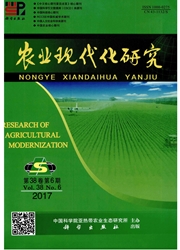

 中文摘要:
中文摘要:
改革开放以来,我国畜禽养殖业发展迅速,引发了严峻的环境污染问题,直接关系到畜禽养殖业的可持续发展。本文以武汉某猪场为个案,分析该猪场开展污染防治的措施、处理效果和经济效益。经监测,粪污经沼气工程处理和还田利用后,污染物含量低于畜禽养殖业水污染物排放标准,土壤肥力有显著提高且未出现重金属元素含量超标现象。通过粪肥还田和沼气集中供户,园区减少了化肥和燃料投入,节能减排效果突出。研究表明,该猪场通过开展环境污染防治,不仅解决了污染问题,还搭建起良性的种养结合循环农业系统,取得了良好的经济效益,实现了可持续发展,为我国畜禽养殖污染防治提供了有益的政策启示。
 英文摘要:
英文摘要:
Since the Reform and Opening-up, the livestock industry has been developed rapidly but caused serious environmental pollution problems, which directly influence the sustainable development of livestock industry in China. This paper took a case of a pig farm in Wuhan to analyze the treatment effect and economic benefits of measures applied for pollution prevention. When the manure was treated via the biogas project and applied to the field as organic fertilizers, the contaminant levels were below the livestock breeding industry standards for water pollution, also In addition, the soil fertility was improved significantly and the heavy metals in soils were detected not exceeding the safe soil standards. The input of fertilizers and fuels was reduced in this pig farm as the pig manure was used as farmland's fertilizer and biogas as farmers' fuel. The benefits of energy conservation and greenhouse gas emission reduction were prominent. This study showed that this farm not only solved the pollution problem, but also built up a virtuous circular agriculture with the planting and breeding combination, which achieved good economic benefits, sustainable development, and pollution prevention. The case we showed here provided a useful policy implication for livestock environmental pollution prevention in China.
 同期刊论文项目
同期刊论文项目
 同项目期刊论文
同项目期刊论文
 期刊信息
期刊信息
